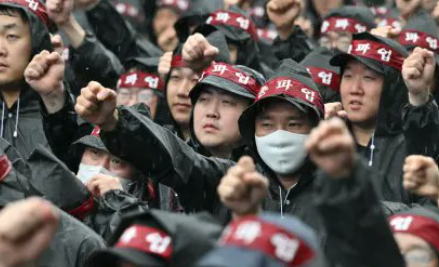No one expected the company to ever have a strike. It was known to avoid such confrontations for decades.
In a landmark move in the history of Samsung Electronics, unionized workers in South Korea have declared an indefinite continuation of their strike, initially sparked by demands for improved pay and benefits. This decision follows a three-day walkout that marked the first-ever strike at Samsung, a major global player in the electronics industry.
On Wednesday, over 30,000 members of the National Samsung Electronics Union (NSEU) intensified their protest after unsuccessful attempts to engage company executives in negotiations. The union’s demands include a 3.5 percent increase in base salaries, an additional holiday to commemorate the union’s founding, and a revision of the bonus system to reduce disparities between executives and rank-and-file employees.
The Samsung Electronics union has called an indefinite strike, threatening the production of memory chips and a deal with NVIDIA. Workers are demanding higher wages and more vacations. The strike could disrupt the production of processors and NVM memory, which worries investors. pic.twitter.com/LfX8glJ6x8
— SARCOP (@sarcoqp) July 10, 2024
Despite Samsung announcing a significant surge in operating profits—estimated to have increased fifteenfold from the previous quarter due to a spike in semiconductor prices fueled by the AI technology boom—the union alleges that the prosperity has not been equitably shared among its workforce. According to the NSEU, their strike has already begun to impact production on certain chip lines, a claim that Samsung staunchly denies. The company maintains that the initial strike had no effect on its chip production and has reassured stakeholders that measures are in place to prevent any disruption in production.
Union leaders reported that approximately 6,500 workers participated in the initial strike, and they are now urging the rest of their members, who constitute nearly a quarter of Samsung Electronics’ workforce in South Korea, to join the ongoing walkout. NSEU vice president Son Woo-mok, during a live broadcast on YouTube, called for increased solidarity among union members, emphasizing the need for greater collective action to leverage negotiations with the company.
‘Don’t get tired’: Samsung Electronics workers extend strike indefinitely, say chip production disrupted pic.twitter.com/pinJdRdHdt
— Murdered by words (@Faix_jn) July 10, 2024
The strike comes at a critical juncture for Samsung, following a significant downturn in profits in 2023 attributed to weakened global demand for memory chips. With the company recently experiencing a rebound in its financial performance, the strike poses a potential threat not just to Samsung’s recovery but also to the South Korean economy at large. Samsung is a cornerstone of the national economy, responsible for approximately 20 percent of the country’s GDP.
South Korea workers at Samsung announce indefinite strike action https://t.co/kmtzjceqeu
— Morning Star (@M_Star_Online) July 10, 2024
Key Points:
i. Unionized workers at Samsung Electronics in South Korea have extended their strike indefinitely, demanding better pay and benefits.
ii. The National Samsung Electronics Union is seeking a 3.5% salary increase, an extra holiday, and a more equitable bonus system.
iii. Samsung, a key player in the global electronics market, has seen a massive increase in profits due to a surge in semiconductor prices.
iv. The company denies any impact on production due to the strike, despite claims from the union to the contrary.
v. The ongoing labor dispute poses significant implications for Samsung’s recovery and could impact the broader South Korean economy.
Fallon Jacobson – Reprinted with permission of Whatfinger News



